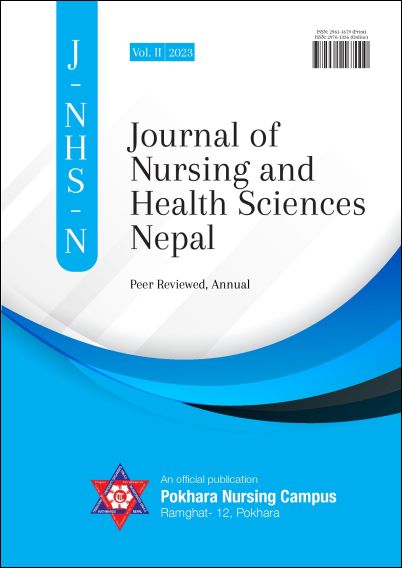Effectiveness of Simulation Based Education on Competencies on Helping Babies Breathe and Perceived Self-Efficacy among Undergraduate Nursing Students, Kathmandu
DOI:
https://doi.org/10.3126/jnhsn.v2i1.66426Keywords:
Competencies on Helping Babies Breathe, perceived self-efficacy, simulation based educationAbstract
Introduction: Simulation based education is an intervention that enable students to become competent in performing clinical skills. The study aimed to find out the effectiveness of simulation-based education on competencies on performing Helping Babies Breathe (HBB)and perceived self-efficacy on performing Helping Babies Breathe among nursing students.
Methods: Pre-experimental study design was adopted. Total 40 nursing students of BSc third year were included. Initially, pre-intervention data was obtained and simulation-based intervention on skills practice on Helping Babies Breathe was intervene by research team members based on HBB guideline and post-intervention data was obtained after 4 weeks of intervention. Data were analysed by using descriptive and inferential statistics specifically, paired t-test and Wilcoxon test was used
Results: All most all participants were able to initiate effective ventilation within a minute in post-test. The skills scores on performing all the steps of effective ventilation in post-test were increased. Specifically, there is a significant increased on skills score on initial steps of HBB after intervention with (p=0.001), birth time to initiation of effective ventilation (p= 0.002), continuing effective ventilation (p=0.005) and on overall skill competencies for performing HBB per minute (p=0.000). Regarding their perceived self-efficacy on performing HBB, score was higher on all aspects after intervention.
Conclusions: Statistical significant increased scores on skills on performing Helping Babies Breathe (HBB)on post-test than pre-test signifies that simulation based education on HBB is effective on increasing skills competencies among nursing students and enhancing their perceived self-efficacy. Thus, skills practice on HBB is recommended to promote among nursing students in simulated labs.
Downloads
Downloads
Published
How to Cite
Issue
Section
License
Copyright (c) 2023 The Author(s)

This work is licensed under a Creative Commons Attribution 4.0 International License.
This license enables reusers to distribute, remix, adapt, and build upon the material in any medium or format, so long as attribution is given to the creator. The license allows for commercial use.




